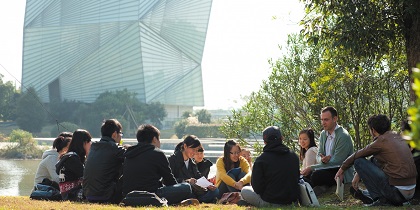
March 4, 2016, by Carla
How to Apply for an Academic Job in China and Be Successful
By Dr Wan (Victoria) Hu; MA Chinese/English Translation and Interpreting, and PhD Translation Studies at The University of Nottingham. Dr Hu is now a lecturer in Translation and Interpreting Studies at the Central University of Finance and Economics in Beijing.
The number of Chinese students in the UK is increasing, and if you are a PhD student, you may be considering returning home to start a career in academia after graduation. As a PhD graduate and now a lecturer myself, here is my step-by-step guide to securing an academic position in China.
Step 1: Gathering information
Chinese state-owned universities normally post job vacancies on their own official websites. Their recruiting time is usually from December to May, but each university will have its own specific recruitment period, so keep an eye on their websites.
In addition, there are also some Sino-foreign universities in China. These universities may not follow the above time period. They may only post job advertisements when they really have vacancies, and will usually post them on academic job boards.
Step 2: Preparing and completing your application
When it came to making my applications, I found it very useful to attend courses put on by the Graduate School and Careers service, such as how to write an academic CV, and how to apply for academic jobs in China. The supervisors in my school gave extensive support for reference letters. Gathering various suggestions from different parties and applying these ideas to my own applications was vital to my success.
There is usually an application system on each university’s website. The online questions are not difficult, some may even overlap with what’s on your CV. You need to be patient and careful, ensuring you have completed every section before submitting your application online.
Step 3: The interview stage
If you are lucky enough to be shortlisted, you will be invited to an interview. The panel will normally consist of the head of school, party secretary, deputy heads of school, and/or directors of departments or research centres. Some of them may share the same research interests as you, but they may also know little about your area. Therefore, you should aim to present all your information in a simple, clear and logical way.
In preparation for my interview, I had a one-to-one consultation with Clare Jones from the Careers and Employability Service who gave me valuable advice on my interview technique.
“As a PhD student, you are trained to be a researcher. The employers are hoping to see this during the interview.”
I also consulted two professors, one from the Business School and the other from the School of Contemporary Chinese Studies, who both gave me great advice about staff recruitment and interviews in China.
They helped me to prepare for the common stages of the interview process:
- Teaching a class
- Giving a presentation about your academic and research achievements
- Formal interview in front of a panel
Step 4: Don’t forget the physical!
A physical test is also required as part of the recruitment process for Chinese universities. It’s an easy stage to forget, so stay healthy and bear it in mind as you approach this stage.
Final step: Making a decision
Before closing, I would like to further elaborate two points.
- How you ‘fit’ is very important. You need to be sure that your teaching, research or administrative interests fit the school/department’s needs and expectations.
- The second point is preparation. This is a key element when searching for academic jobs in China. I had a notepad detailing my target universities, their requirements, and their deadlines.
Last but not least, it’s worth noting that graduates from The University of Nottingham are in high demand at Chinese universities. You are viewed as a graduate with a world-leading degree, research and teaching potential, transferable skills, and a fresh perspective.

[…] Some clear and practical advice for making applications for academic jobs in China is summarised by a University of Nottingham PhD graduate, Dr Wan Hu, now a lecturer in Translation and Interpreting Studies at the Central University of Finance and Economics in Beijing. Check out her helpful, detailed blog post. […]